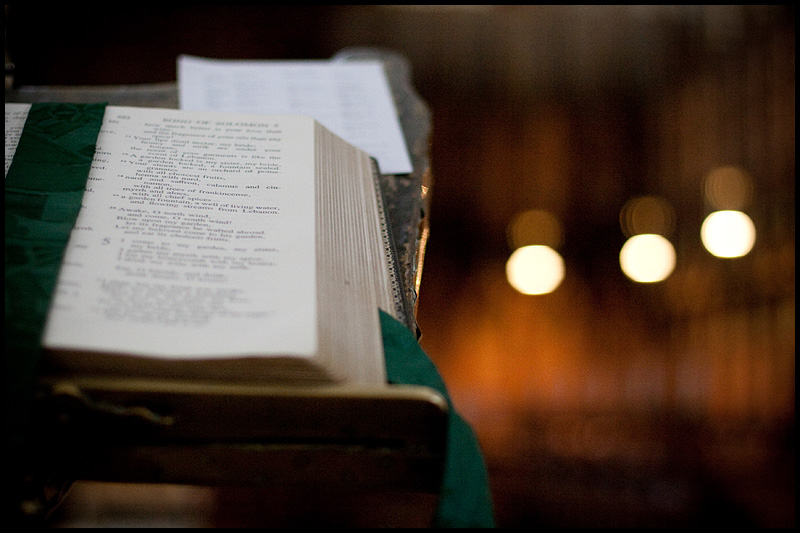One of the hardest things about being a teacher of preachers is that I don’t serve a church. I sometimes feel like I exist in a performative contradiction. Why would people pay attention to what I say about the biblical texts each and every week when I don’t preach each and every week? Why would you all listen to what I have to say when I am not actually in a parish? Why would you think I have insights on the weekly texts when weekly I don’t have to preach on them? I am constantly thinking about how not to become this insular teacher of preachers. I worry that I might dissolve into mere theories about preaching rather than find the words that really do preach.
Which is why I am so grateful for this column. To some extent, it legitimizes my teaching. How can I teach preaching? Well, in part, because I am forced to think about these texts each and every week for the sake of proclamation. I find ways to talk about these texts with others so that I sense the urgency of God’s word. [1] F. Scott Fitzgerald’s birthday was September 24 and this quote popped up on my Facebook feed: replace “write” with “preach,” “You don’t write because you want to say something, you write because you have to say something.”
So, I suspect this request of the disciples is one dreaded by pastors; a plea from parishioners that the preacher most fears. To what extent we want our preaching to increase faith, make a difference. And yet, we ask for the same incremental amount as the first disciples. Please, Jesus. Increase the faith of those to whom I minister, with whom I do ministry. Please, Jesus. Increase my own.
Dear Working Preachers, stop and think about this moment in Luke’s gospel. This bid of the disciples. This plea from those who wonder — can I really do this? This request, that, if we are honest, rings a bit of desperation, tapping into our doubts, our fears, our longings when it comes to wondering, what is our faith good for? Does our faith get us anywhere? Is our faith worth anything?
When have you asked this of Jesus? For us preachers living in the United States, it seems like it’s been our daily request. With the bombing in Manhattan, the killings of Terrence Crutcher and Keith Lamont Scott, the stabbings in St. Cloud, MN; it’s the only response imaginable. And of course, this is only that over which we despair as a nation. Our communal, familial, individual pain adds to the urgency of the plea.
This is the deeper poignancy of the entreaty of the disciples — when we recognize that the request does not only come from those to whom we preach and from those with whom we do ministry, but we realize that the demand of the disciples is our very own. A plea that comes from the darkest places of parish life. A plea that originates from those moments where only the belief in the power of God can truly make a difference. Those times when our own faith is on the line — both because it is being challenged but also because we have never needed it more.
And the request has an even deeper pathos when we are reminded just a few verses later that Jesus and his disciples are on their way to Jerusalem (Luke 17:11). Increase our faith. Please, Jesus. We need it more than ever.
“Increase our faith” indeed comes from fretting and not trusting in the Lord (Psalm 37:1-9). It’s the appeal born out of anxiety. It’s the wish that gives witness to our uncertainties. It’s the petition that points to our discomfort with perplexities.
It gives voice to those times in our lives when we just need Jesus to make things easier, when we need some answers. It gives voice to our tendencies toward self-indulgence and our desire for the quickest way to get to the end. It gives voice to when we just want to get done and be done. It gives voice to those moments when we are tired of thinking and just want assurance. It gives voice to wanting quick solutions instead of the making the effort that is necessary to discover the root cause. It gives voice to our ultimate idolatry when it comes to God — certainty.
But, what is truly at the heart of such a request? What do we imagine that more faith will get us? An easier life? Less pain? More certainty? Effortless answers?
That’s the rub of this question. Were it only about a request for faith, that would be one thing, complicated, but more manageable. Clearly, having faith is better than not having it. But the rub is how much; how to measure faith. Our lives, our culture, our society depend on and feed off of quantifiers, with usually more being better. And perhaps the fact that faith is not quantifiable is one of the most difficult things to accept about it.
But maybe hidden in that immeasurability is the promise of this text. And maybe the mixed response of Jesus points to this very truth — that faith in God works something like God’s love for us — immeasurable, inestimable, and incalculable. God does not measure our faith any more than God can, than we can, measure God’s love for us.
And one more word of promise — note that the petition is “increase our faith” not “increase my faith.” The power of the community of the faithful around us is just as unquantifiable as faith itself. We do none of this alone.
Karoline
[1] I am grateful to Lisa and Robb Bass and members of Diamond Lake Lutheran Church for great conversation about the Gospel lesson for this week.

